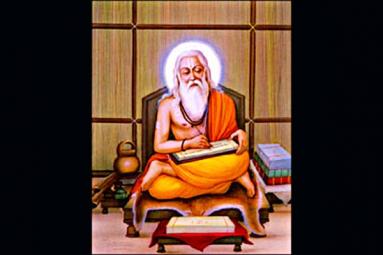
The Vedas are the main scriptural texts of the Hindu religion. The term Veda comes from the root 'Vid', to know. The word Veda means knowledge. When it is applied to scripture, it signifies a book of knowledge. The Vedas are the foundational scriptures of the Hindus. Initially the Vedas were considered so sacred that they were only transmitted orally from one generation of brahmans to the next. The passages of the Vedas were eventually written in Sanskrit, we believe, near the end of the third century BC. Hindus believe that the vedas were revealed or "heared" (Srutri), not composed by human beings, and that the power of Gods lies in these revealed words. Because they contain the sacred syllables from which Gods and mortals were born, the vedas are thought to have preceded the universe, itself created from the scared syllable OM.
The Vedas are the ultimate source to which all religious knowledge can be traced.The Vedas are eternal. They
are without beginning and end. An ignorant man, may say how a book can be without beginning or end. By the Vedas, no books are meant. Vedas came out of the breath of the Lord. They are not the composition of any human mind. They were never written, never created. Vedas are eternal spiritual truths. Vedas are an embodiment of divine knowledge. The books may be destroyed, but the knowledge cannot be destroyed. Knowledge is eternal. In that sense, the Vedas are eternal.
There are four Vedas : the first, the Rigveda, was composed before 1200 BC, followed by Samaveda and the Yajurveda and finally the Atharvaveda. Each vedas is composed of two parts : the Samhita, in which the hymns or mantras are recited, and the Brahmanas which contain commentaries.
The Rigveda: The Rigveda ("Wisdom of the Verses") contains 1,028 hymns dedicated to thirty-three different Gods, but mostly to Lord Indra, Agni and Soma. The 10,589 verses of Rigveda are divided into 10 mandalas or books. Its priest is called the Hotri, who officiated at scarifices and recited the mantras of the Rigveda.
The Samaveda : The Samaveda ("Wisdom of the Chants") is better known for the intricacy and metre of its poetry. The Samaveda is a collection samans or chants, drawn mainly from the eight and ninth books of Rigveda, for the udgatri priests who officiated at the soma sacrifice. The Samaveda is a collection of songs than of mantras.
The Yajurveda: Yajurs are sacred formulas, invocations and spells muttered by the adhvaryu priests who performed sacrificial rites, so the Yajurveda is called the "wisdom of the sacrifices". This work contains specific sacrificial formulas which were recited during that form of ceremony.
The Atharvaveda : The Atharvaveda ("Wisdom of the Priests") is attributed to a sage, or rishi, named Atharvan, and consists of a number of hymns and magical incantations. Some scholars believe that this scripture may have originated with the original pre-Aryan culture of indigenous peoples, and because it deviated form the other Vedas, it was not at first readily accepted. Eventually it too was adopted as a ritual handbook by the Brahmans, the highest class of priests.
Source: indif










